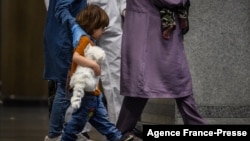Activists are calling for a policy change to improve the treatment of undocumented immigrants in South Korea, following recent instances of abuse against asylum seekers.
Under the current immigration policy, anyone who has received a deportation order – including those whose refugee applications are still in process – can be interned for an indefinite period of time.
Refugee rights groups have long emphasized the need for the government to revise the relevant legal language, Article 63 Clause 1 of the Immigration Act, which they see as a punitive measure that violates the rights of asylum seekers.
Now, as news of consecutive cases of abuse inside the detention facilities spread, the movement to revise the law may be gaining momentum.
Immigrant rights are an often-neglected issue in South Korea, historically an ethnically homogeneous country where foreigners still account for only 4% of the country’s total population.
In 2020, South Korea accepted only 0.4% of refugee applications, according to government data, well below the average for other developed countries.
Abusive detention
The latest instance came Dec. 23, when an asylum seeker at an immigration detention center in Hwaseong, about 40 kilometers south of Seoul, received emergency medical care after injuring himself while lashing out during what activists describe as a period of prolonged, inappropriate treatment.
The man in his thirties, known only as Y in South Korean media, was cut by ceramic pieces from a toilet that he broke while resisting his detention, according to Sim Ah-jung, a refugee rights activist in close contact with the detainee.
Y has spent 11 months in a windowless cell at the detention facility and has been barred from regular outdoor exercise sessions because he is HIV-positive, Sim said. Y is in the process of appealing his rejected refugee application.
“The government purports that he was put into solitary confinement to ‘prevent the spread of HIV,’ but HIV is not transmissible through air. Segregation of persons living with HIV is an obvious violation of human rights according to international standards,” said Sim, the author of the book Refugees, Being Subject to Refugeeism.
“Y was put into solitary confinement for months on end. And like most of his fellow detainees, he still doesn’t know when his detention will end. This aspect of gross uncertainty is a cause of great distress for the detainees, many of whom are already suffering from mental illnesses and trauma as asylum seekers,” she said.
Indefinite detention
While deportation proceedings are known to take about 15 days on average, according to government statistics from 2018-21, they are routinely extended by the government when immediate repatriation is deemed not feasible.
As a result, some detainees have spent as long as four years and eight months inside these facilities, immigrant rights advocates say.
Most often, it is asylum seekers who cannot return to their home country for security reasons who are left in the dark, without knowing how long their internment will last.
“The most problematic aspect is that there is no upper cap to the length of the detention nor a procedural opening that allows detainees to appeal the decision when their detention periods are extended,” said Lee Il, an immigration lawyer at Advocates for Public Interest Law.
“As the Ministry of Justice delivers these decisions single-handedly, the detainees are also stripped of the opportunity to ask for an external review of the legality and necessity of the detention in the process,” he said.
Tied up ‘like an animal’
In September, surveillance footage from the same detention facility in Hwaseong showed a Moroccan asylum seeker lying on the floor with his limbs tied back in a tiny solitary confinement cell. His legal representatives alleged the man had suffered torture-like treatment.
“They put me on my stomach and tied me with [a] rope. They tied me [up] like an animal. I could not breathe. I was not able to see my doctor for over five months,” the detainee said, describing the treatment in a phone interview with a local journalist.
Upon release of this footage, the detention facility defended its action, saying that “putting him in protective measures was inevitable” as he was violently protesting, destroying property, and attempting to hurt himself.
After an investigation, both the national human rights watchdog, the National Human Rights Commision of Korea, and the Justice Ministry acknowledged authorities used excessive force to restrain him and violated his rights in the process.
The ministry vowed to revise the protocols regulating the use of “protective gear” at detention centers and to better educate its officers, but refugee rights organizations maintain that a more structural change is required to address the root of the problem.
“The first step should be a legal change,” Sim said.
Legal review
In February of last year, the Seoul Administrative Court delivered a ruling that questioned the constitutionality of Article 63, Clause 1 of the Immigration Act – which has until now allowed the government to indefinitely intern people who have received deportation orders.
As a result, the law is currently under review at the constitutional court for the third time, after reviews in 2018 and 2019. More than five out of nine judges would have to rule it unconstitutional in order for the clause to be revised.
The verdict is expected to be released next month.




